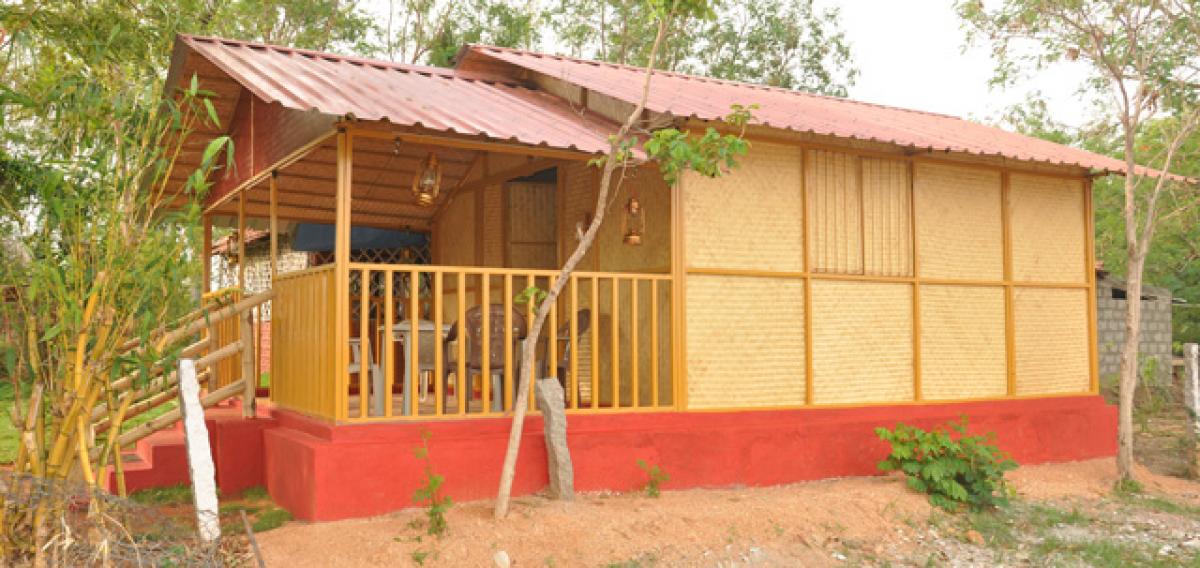Live
- 19 agritech soonicorns, 40 minicorns embracing emerging tech for biz growth: RBI paper
- Leopard rescued from well released into forest
- TDP Urges Centre for debate on key issues of AP in winter session
- Maharashtra trusted us, not Oppn's divisive politics: Shiv Sena leader
- Jordan Cox ruled out of England's Test series in New Zealand due to a broken thumb
- BUDA Commissioner and member arrested
- Tender to be called for new gates to TB dam in January
- TTD EO inspects Tiruchanoor Brahmotsavam arrangements
- Crisis grips Davanagere farmers despite bumper crop
- NSU probes drug use incident
Just In

The Kenyan government invited Prashant to develop bamboo livelihoods and create bamboo based business models as Africa has huge bamboo resources. The Amazon Forest Foundation too is evincing interest and wants Bamboo House India (BHI) to help create bamboo houses for tribes.
Hyderabad: The Kenyan government invited Prashant to develop bamboo livelihoods and create bamboo based business models as Africa has huge bamboo resources. The Amazon Forest Foundation too is evincing interest and wants Bamboo House India (BHI) to help create bamboo houses for tribes.
The Andhra Pradesh government has roped in BHI to build cottages in tourist resorts and the Greater Hyderabad Municipal Corporation (GHMC) is partnering with BHI for a conference hall at its zonal office in Khairtabad made fully of bamboo. And scores of individuals are interested in bamboo houses.
“Just three years ago, no one was showing interest except for a few. The turnaround came when we changed the business model as we realised that pole bamboo does not work for India and bamboo boards will. This after we burnt our pockets and went into a Rs 60 lakh debt,” says Prashant.
For years, BHI paid salaries to almost 20 workers despite lack of orders and kept researching on bamboo. Though bamboo is abundantly available in India, the bamboo business is plagued by archaic laws. The Indian Forest Act of 1927, classifies bamboo as a tree and not grass. As a result, it puts restriction on its harvest, transit and trade.
In the initial years, Prashant ordered truckloads of bamboo from Tripura but now he gets finished bamboo boards and is now able to construct five bamboo houses a month and has work for the next 12 months. “We had to unlearn and relearn. From 2012 till date we completed close to 200 bamboo houses. People now realise that bamboo houses are sustainable and the myth that bamboo houses are weak is slowly weaning.
Bamboo business should not be confined to just cane furniture, avers Prashant. Low cost bamboo houses could be the future to maintain ecological balance. Many countries are taking to bamboo. Speaking about the Kenya project, he says that two trainers would help local communities build a sustainable bamboo business model for a year.
“A major challenge would be to understand the local market and develop a business model,” says Prashant. Prashant is getting international attention but his heart lies in India as he says we are one of the largest producers of bamboo but the least consumers. Bamboo house, anyone? he asks?
By T P Venu

© 2024 Hyderabad Media House Limited/The Hans India. All rights reserved. Powered by hocalwire.com







